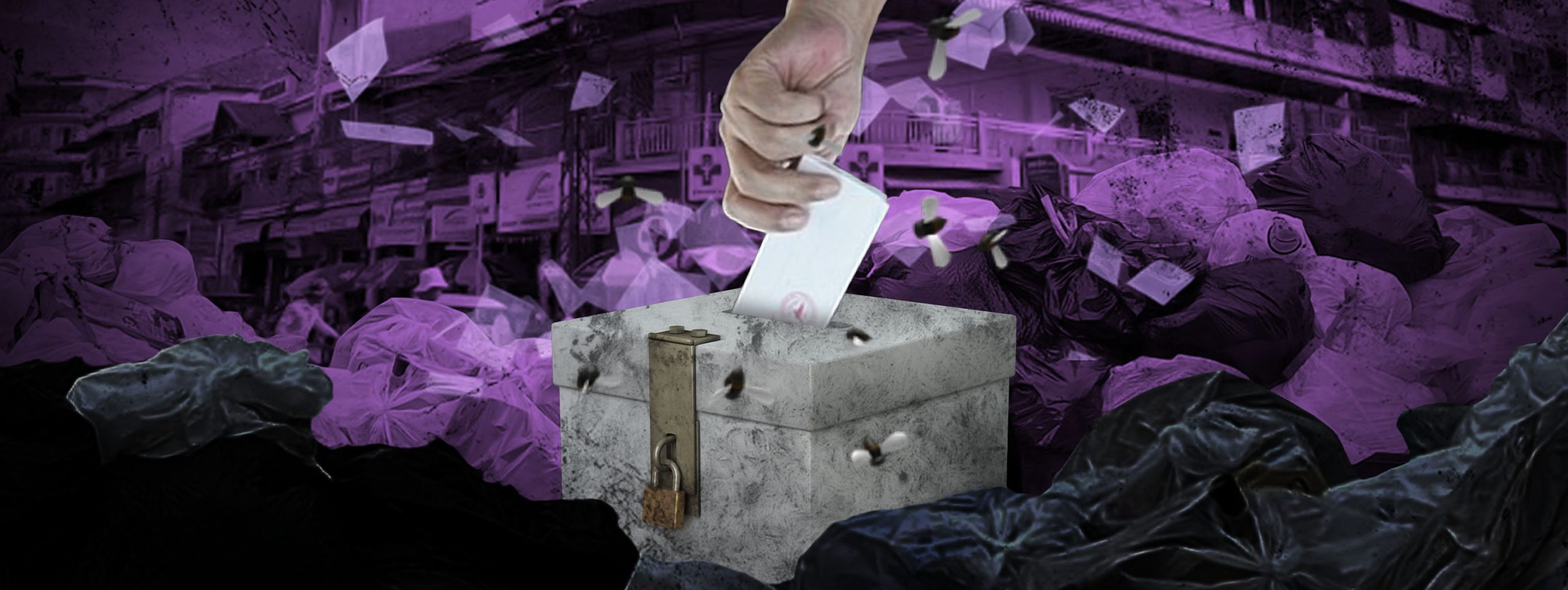|
Getting your Trinity Audio player ready...
|
“Uneasy lies the head that wears the crown,” Shakespeare wrote, and in Cambodia that holds true even though power is about to be handed over to someone else.
Hun Manet, the eldest son of the country’s strongman Hun Sen, is slated to become the prime minister on the evening of 22 August, nearly two months after Cambodia’s latest national elections. But Hun Sen is still bent on going after those he says instigated hundreds of thousands of voters to intentionally spoil their ballots as a sign of protest.
As of this writing, at least 44 people have been accused by Cambodian authorities of inciting voters to spoil their ballots and “sabotage” the 23 July elections; among those known to be targeted by police are members of the defunct “Sabai Sabay (Happy Happy)” Telegram group who are believed to be supporters of the main opposition Candle Light Party (CLP).
At least six people, including three CLP members, have already been arrested and detained in connection with the spoiled-ballots issue. The National Election Committee (NEC) has also found 21 people guilty of breaking the Election Law, and has removed their names from the voter’ list and disenfranchised them for 20 years; they have each been filed KHR 10 million (US$2,413). They may also be facing other criminal charges.
NEC spokesman Hang Puthea said the 21 broke the law by posting instructions on social media on how voters can invalidate their ballots.
Political observers say that Hun Sen had been keen to have the recent polls yield an unquestionable mandate for the ruling Cambodian People’s Party (CPP) to ensure that his son’s ascent to power will be unopposed. Just a month before the recent polls, the national legislature approved changes in the election law, including one that barred anyone who boycotted the elections from running for public office. Voluntarily spoiling one’s ballot can also mean a fine of KHR 20 million (US$4,827).
Yet many still went ahead and spoiled their ballots. According to one 42-year-old voter, he had done so because he was dissatisfied and unhappy with the elections, which he said were “fraudulent.” He also called the polls “rigged,” pointing out that it was without the opposition party he “loved and supported,” and that authorities had forced people to cast their ballots by threatening them. Local officials put pressure on the people to make them vote, he said, and threatened to withhold services for non-voters.
But the voter from Battambang province told ADC that he has since been forced to go into hiding “as authorities are pursuing” him after he was found to have spoiled his ballot. He said that authorities had also questioned his relatives.
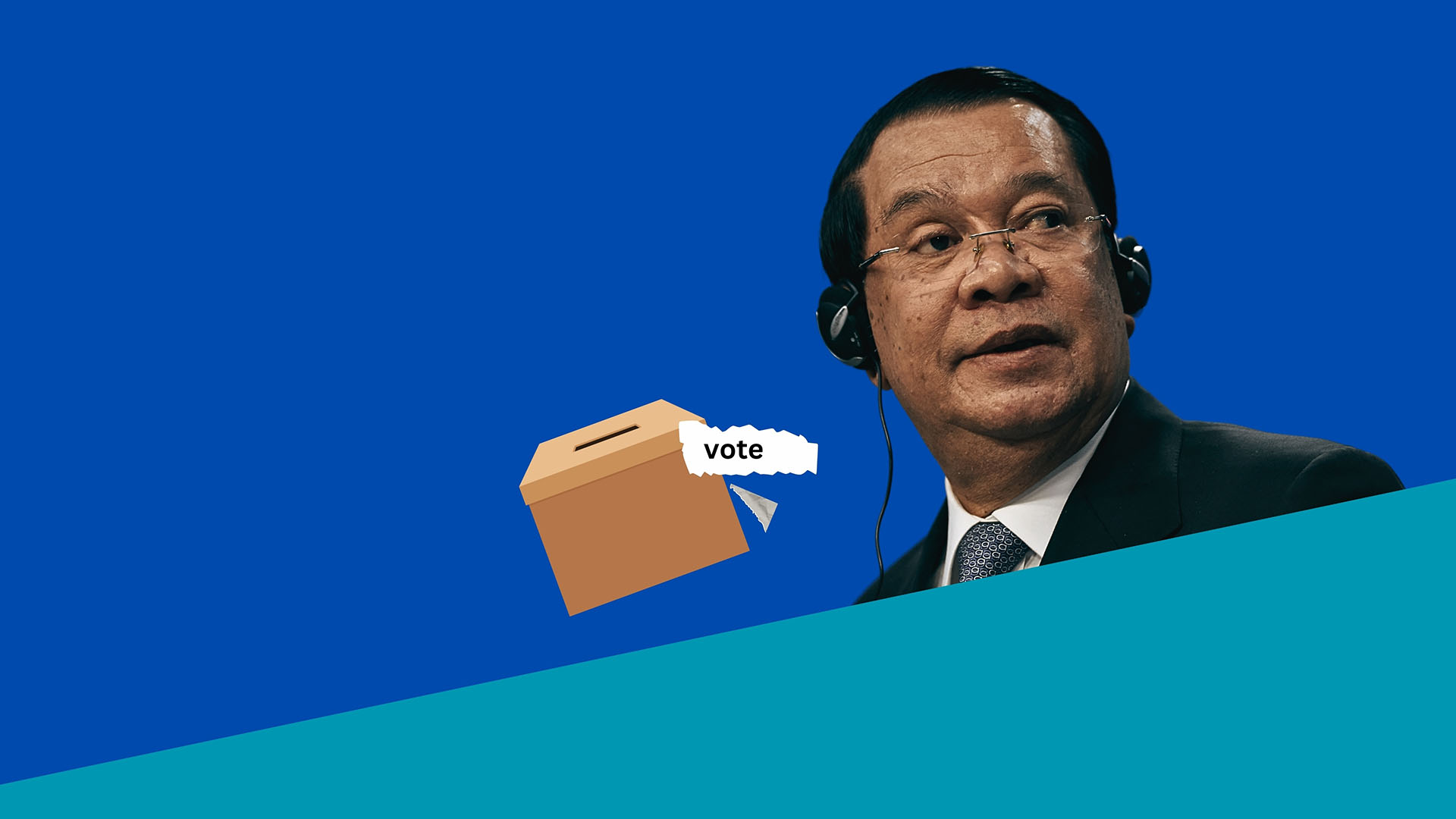
Getting rid of rivals
Last May, the NEC had banned the CLP and another party from running in the elections because it said these had submitted defective and incomplete documents. That left Hun Sen’s CPP virtually unopposed, although there were also several small parties than participated in the polls. In the end, the CPP took 120 of the 125 seats in the legislature, with the royalist FUNCINPEC party taking the remaining five.
According to the NEC, at least 440,000 ballots were spoiled in the elections that saw a voter turnout of some 85 percent. An article on the U.S.-based legal news website JURIST meanwhile said that the spoiled ballots represented some 5.35 percent of the votes cast, even as it noted that the “global average rate of invalid votes is 3.80 percent.”
In Cambodia’s 2018 national elections, nearly 8.6 percent of the votes cast were deemed spoiled. Months before, the then main opposition Cambodian National Rescue Party (CNRP) was forcibly dissolved, prompting it to call for a boycott of the polls. That call failed as authorities threatened people planning not to vote, but many apparently turned to intentionally spoiling their ballots.
This time around, self-exiled Cambodian opposition figure Sam Rainy openly called on voters to spoil their ballots “to express their opposition to the Hun Sen regime and their desire for change.”
In a video message posted on his Facebook page on 4 July, Sam Rainsy said, “Spoiling the ballot is not contrary to any law and is a legitimate act by a protesting voter.”
“The leadership of Mr. Hun Sen has ruined the electoral process by forbidding the opposition from participating,” he added. “The downfall of democracy itself is the true crime.”
“Without any meaningful opposition alternative to Mr. Hun Sen’s Cambodian People’s Party,” Sam Rainsy said, people should “expect a large number of spoiled and empty ballots” come election day.
A 54-year-old voter said, though, that he chose to spoil his ballot not because someone told him to do so, but because he did not like that the elections were “unfree, non-transparent, and not peaceful.” He also said that he was dissatisfied with the polls because the NEC had banned the CLP from running.
The voter told ADC that he considered it his right to spoil his own ballot. “The local authorities in my village always persuaded me to vote for the ruling party, but I did not support the ruling party,” he said. “I do not like the ruling CPP’s leadership because they are corrupt, partisan, and do not respect human rights.”
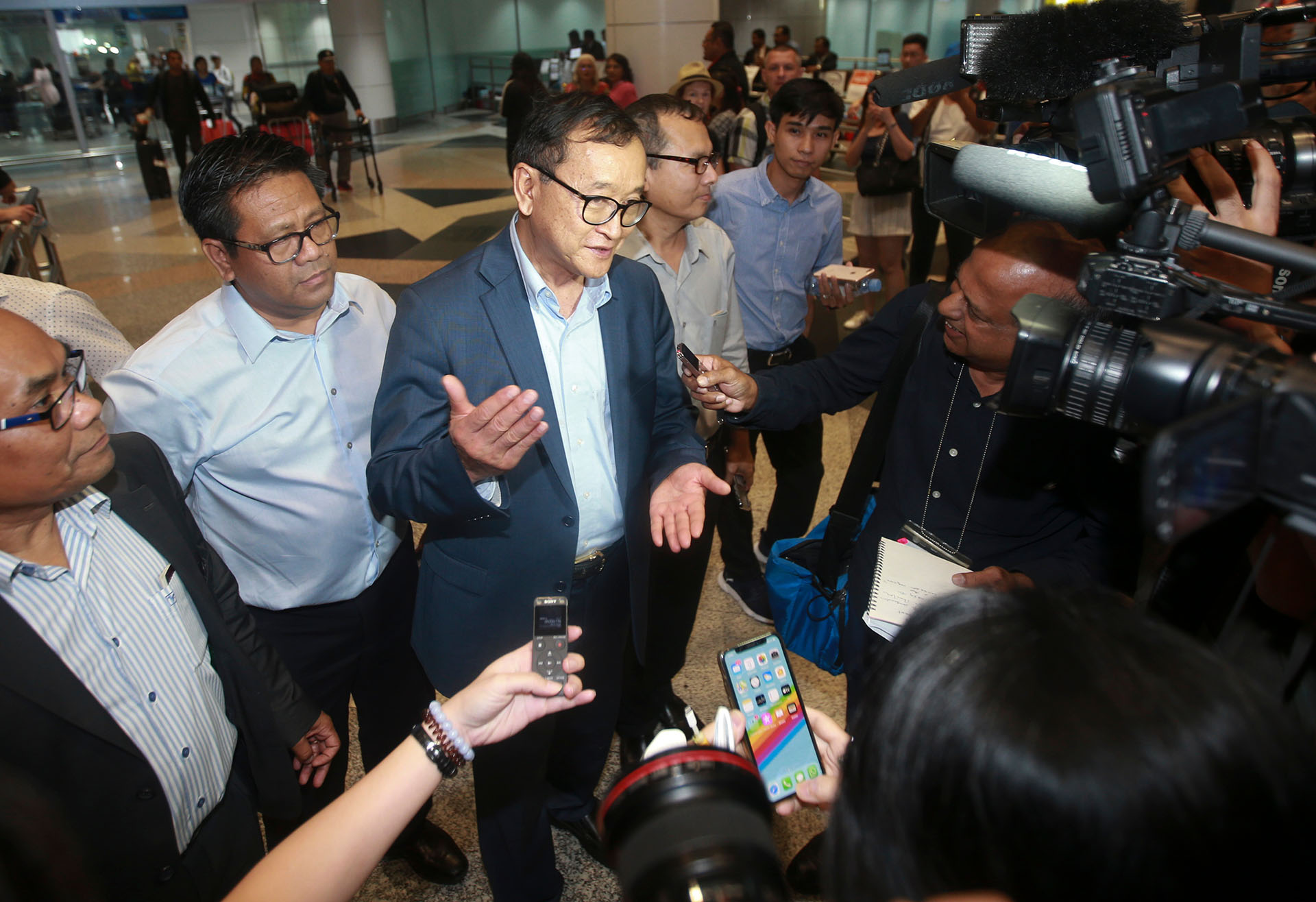
A voter’s right
In “free and fair elections in other countries,” said independent political analyst Meas Nee, it is the right of voters to express themselves however they want through the ballot. Some democracies have also had spoiled ballots in their elections, he said, but these were in small numbers and authorities there had considered these as an exercise of the voters’ civil liberties.
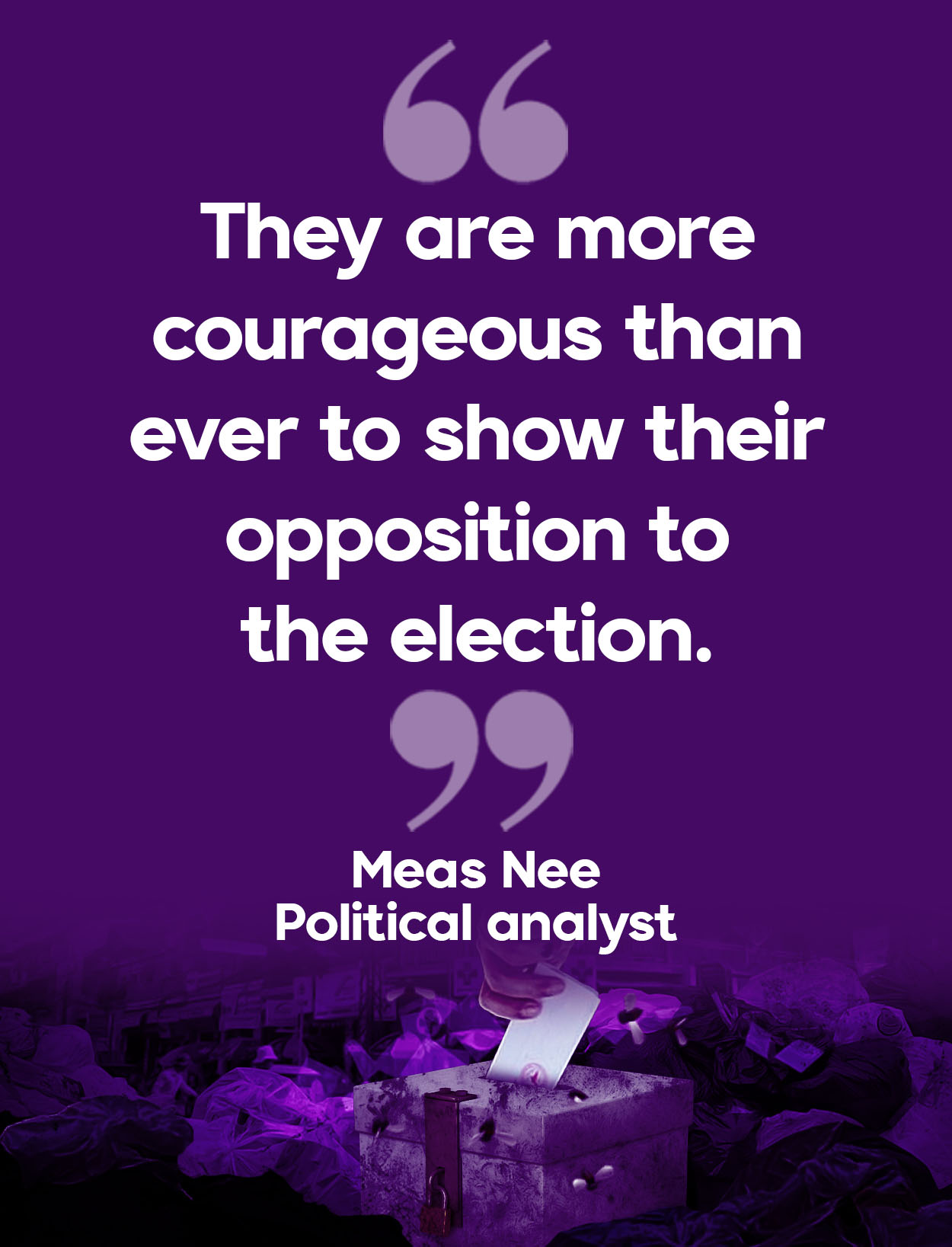 By contrast, he said, spoiling one’s ballot in Cambodia is seen by authorities as destructive and leading to crime and unrest in the country.
By contrast, he said, spoiling one’s ballot in Cambodia is seen by authorities as destructive and leading to crime and unrest in the country.
Meas Nee said that the large number of spoiled ballots in the recent elections only shows that the ruling party’s incessant threats are falling on deaf ears and that it may have difficulty in preventing people from going against it.
“Spoiled ballots in such a large number also show the influence of the opposition party, as well as the people’s dissatisfaction with the national elections,” he said. “They are more courageous than ever to show their opposition to the election.”
He said that despite Sam Rainsy being overseas, “his appeal has also had an impact on opposition supporters.”
Sam Kuntheamy, executive director of Neutral and Impartial Committee for Free and Fair Elections in Cambodia (NICFEC), also said that spoiling one’s own ballot is part of a voter’s freedom. This action is not against the law, he insisted, and merely shows that the voter dislikes something about the election.
He noted as well, “Even if the number of spoiled ballots is combined with the number of people who did not go to the polls, it will not be able to affect the election results. But it is clear that the majority of the people are not happy with the national election.”
Korn Savang, an advocacy coordinator at the Committee for Free and Fair Elections in Cambodia (Comfrel), for his part said that if people accidentally or carelessly spoil their ballots while voting, the police will not have the right to investigate them. He said, though, “I would like to emphasize that if another person acts by forcing or inciting the people to spoil ballot or to prevent the people from going to the polls, they will be punished according to the election law, Articles 142 and 143.”
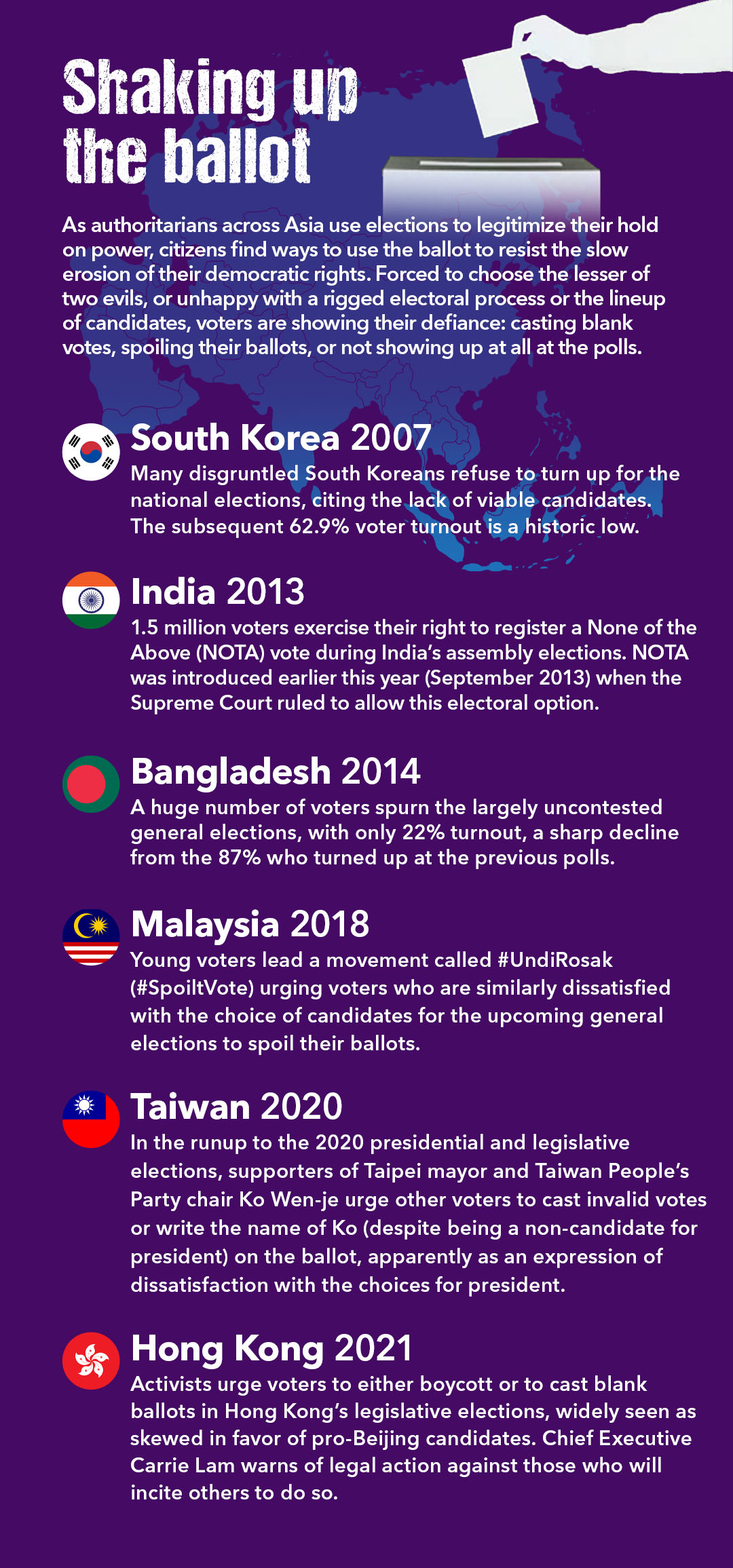
Two statements, two views
A statement dated 24 July by Ministry of Foreign Affairs and International Cooperation said, “Rights and responsibilities are inseparable, and the strict observance of the electoral law is essential to ensure the impartiality of the electoral process. Those who fail to fully comply with the law must bear the consequences.”
It said, however, that the 23 July elections had “exemplified a genuine political pluralism, offering Cambodian citizens and their respective political parties with an equal and fair opportunity to engage in political contests within the confines of the law.”
The ministry asserted that the elections had been “objectively witnessed by 422 international observers, representing 65 nationalities from 61 institutions, encompassing international organizations, foreign governments, diplomatic circles, and Cambodian diaspora communities. The electoral proceeding was closely monitored by nearly 60,000 representatives from political parties’ agents and 90,000 independent national observers, collectively attesting to the fairness and transparency of the process.”
Moreover, it said that “(this) highest voter turnout is a definite rejection of calls for electoral boycotts, and smear campaigns orchestrated by extremist opposition factions seeking regime change through undemocratic tactics.”
Western countries including the United States and members of the European Union had chosen not to send observers to the polls that they said were not going to be free and fair, given the Hun Sen administration’s treatment of the opposition. China and Russia, however, sent observers, as did Guinea-Bissau, said The Guardian, citing a report from the Associated Press.
In a 23 July statement, U.S. State Department Spokesperson Matthew Miller said that in the runup to the elections, “Cambodian authorities engaged in a pattern of threats and harassment against the political opposition, media, and civil society that undermined the spirit of the country’s constitution and Cambodia’s international obligations.”
“These actions denied the Cambodian people a voice and a choice in determining the future of their country,” Miller said. “In response, the United States has taken steps to impose visa restrictions on individuals who undermined democracy and implemented a pause of certain foreign assistance programs.”◉
Hay Setha is a reporter from Cambodia.










